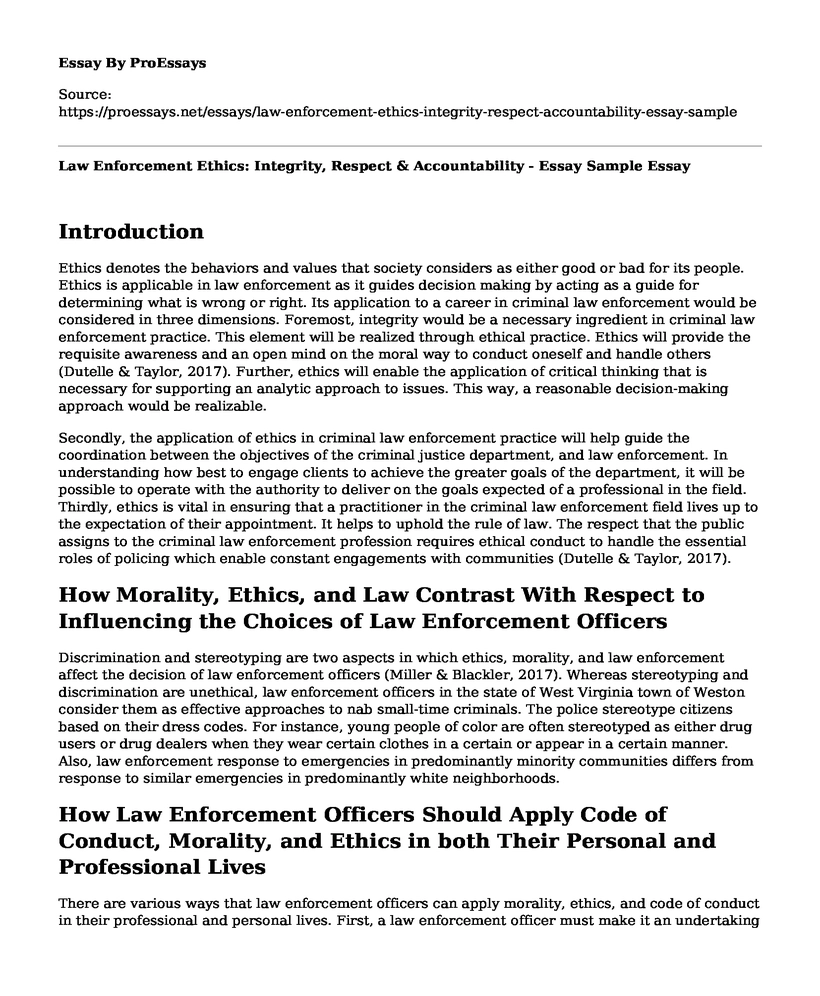Introduction
Ethics denotes the behaviors and values that society considers as either good or bad for its people. Ethics is applicable in law enforcement as it guides decision making by acting as a guide for determining what is wrong or right. Its application to a career in criminal law enforcement would be considered in three dimensions. Foremost, integrity would be a necessary ingredient in criminal law enforcement practice. This element will be realized through ethical practice. Ethics will provide the requisite awareness and an open mind on the moral way to conduct oneself and handle others (Dutelle & Taylor, 2017). Further, ethics will enable the application of critical thinking that is necessary for supporting an analytic approach to issues. This way, a reasonable decision-making approach would be realizable.
Secondly, the application of ethics in criminal law enforcement practice will help guide the coordination between the objectives of the criminal justice department, and law enforcement. In understanding how best to engage clients to achieve the greater goals of the department, it will be possible to operate with the authority to deliver on the goals expected of a professional in the field. Thirdly, ethics is vital in ensuring that a practitioner in the criminal law enforcement field lives up to the expectation of their appointment. It helps to uphold the rule of law. The respect that the public assigns to the criminal law enforcement profession requires ethical conduct to handle the essential roles of policing which enable constant engagements with communities (Dutelle & Taylor, 2017).
How Morality, Ethics, and Law Contrast With Respect to Influencing the Choices of Law Enforcement Officers
Discrimination and stereotyping are two aspects in which ethics, morality, and law enforcement affect the decision of law enforcement officers (Miller & Blackler, 2017). Whereas stereotyping and discrimination are unethical, law enforcement officers in the state of West Virginia town of Weston consider them as effective approaches to nab small-time criminals. The police stereotype citizens based on their dress codes. For instance, young people of color are often stereotyped as either drug users or drug dealers when they wear certain clothes in a certain or appear in a certain manner. Also, law enforcement response to emergencies in predominantly minority communities differs from response to similar emergencies in predominantly white neighborhoods.
How Law Enforcement Officers Should Apply Code of Conduct, Morality, and Ethics in both Their Personal and Professional Lives
There are various ways that law enforcement officers can apply morality, ethics, and code of conduct in their professional and personal lives. First, a law enforcement officer must make it an undertaking to ensure that they are safe and that the persons they serve are equally protected. The officer must, therefore, be forthright all the time, and avoid any urge to steal, cheat, or lie. These are vices that a law enforcement officer must ensure that they are not engaged in and that people around them do not practice (Miller & Blackler, 2017). Secondly, law enforcement officers are expected to practice integrity throughout their personal and professional lives. The badge that the law enforcement officers wear assigns them a higher level of integrity that others look up to.
The Essential Bearings of the Code As They Connect To Law Enforcement Endeavors in the State Of West Virginia Town Of Weston
The two vital bearings of the code which connect to law enforcement undertakings in the state of West Virginia, Town of Weston are integrity and ethics. It is noted that no profession, other than law enforcement demands the highest ethical standards. Consequently, any officer who exhibits any unethical conduct is likely to taint the good name of the entire team (Miller & Blackler, 2017). Secondly, there is integrity. The code of conduct requires that law enforcement officers show the highest level of honesty and strong moral uprightness so that they maintain the trust of the people and act professionally at all times.
References
Dutelle, A. W., & Taylor, R. S. (2017). Ethics for the public service professional. Crc Press.
Miller, S., & Blackler, J. (2017). Ethical issues in policing. Routledge.
Cite this page
Law Enforcement Ethics: Integrity, Respect & Accountability - Essay Sample. (2023, Feb 26). Retrieved from https://proessays.net/essays/law-enforcement-ethics-integrity-respect-accountability-essay-sample
If you are the original author of this essay and no longer wish to have it published on the ProEssays website, please click below to request its removal:
- Not for Sale: The Return of the Global Slave Trade and How We Can Fight It
- Examining Gun Wounds Paper Example
- Essay Sample on 13th: Slavery's Prolonged Legacy of Injustice
- Epistemology: Knowledge-First Approach to Justification and Truth - Essay Sample
- Essay on 76% of US Prisoners Reincarcerated: Inadequate Prison System?
- Essay on Prohibition: 19th Century Social Movements and Its Repeal in 1933
- Essay Example on Exploring Positive Youth Justice: Assessing Claims of Uniqueness and Robustness







